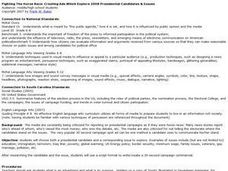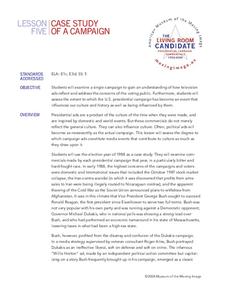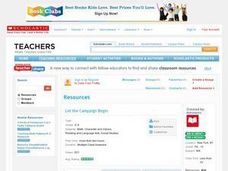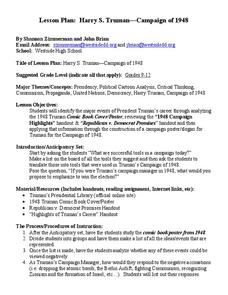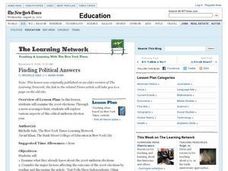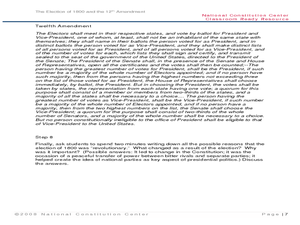Curated OER
They Were Born Where?
Students assess where the presidents of the United States were born and analyze the role of geography in determining the outcome of presidential elections. They create graphs visualizing the birth and home states of the presidents along...
Curated OER
Preparing for Class Hearing
Students prepare and conduct In-Class Hearing. They comprehend what it means to be an informed voter. Pupils answer the following questions at the classroom hearing: "I learned that being an informed voter means _____., and Vital issues...
Curated OER
Fighting The Horse Race: Creating Ads Which Explore 2008 Presidential Candidates & Issues
What is advertising? What role does it plan in an election? Middle and high schoolers discuss advertising and its purpose by sifting through different magazines and discussing the products they find. Then they relate advertisements to...
Curated OER
Asking the Questions and Questioning the Answers
What would you ask a presidential candidate if you had the chance? Bring politics to your language arts classroom with this lesson, in which young readers brainstorm questions they would have liked the presidential candidates to answer....
Curated OER
Case Study of a Campaign
Students read a case study of one campaign to discover how political campaigns addresses the needs of the voters. In groups, they answer questions related to the case and discuss how the commercials affect society as a whole. They use...
Classroom Law Project
What are some of today’s voting issues? Voting in Oregon, youth vote, and technology
The youth vote. Rock the Vote. Vote-By-Mail. Electronic voting. Class members investigate issues facing today's voters, and the ways they have adapted over the years to optimize voter turnout.
PBS
What Are the Primaries and Caucuses?
What are the essential differences between primaries and caucuses? As part of a study of the process by which Americans select their candidates for US president, class members examine the nominating process, the changes that have...
Carolina K-12
Get Out the Vote!
What better way to have a class learn about get out the vote campaigns than by having them create one themselves? After introducing get out the vote efforts and why they exist through videos, articles, and discussion questions, the...
Curated OER
Let the Campaign Begin
Students examine the many steps involved in the electoral process. They examine past president's campaigns and write an announcement speech for the candidate of their choice.
Curated OER
Electing the U.S. President
In this reading comprehension worksheet , young scholars read a factual essay about the American election process. Students then answer 7 questions about this information.
Curated OER
The Presidential Nominating System
Learners examine the process by which candidates for U.S. president are nominated by the Democratic and Republican parties. They identify the differences between primaries and caucuses and key terms and issues related to the primary...
Curated OER
The Electoral Process
Young scholars explore the U.S. political system by completing several worksheets. In this government election lesson, students define and describe the two main political parties in detail to one another. Young scholars read a piece...
Curated OER
It's Election Time!
Learners explore the voting process. They discuss presidential elections, identify the characteristics for what makes the best costume, and participate in a class vote for best class costume.
Curated OER
The Primary Issue
Students analyze the 2008 presidential primaries by reading and discussing the New York Times Upfront article "Primary Matters." They complete a KWL chart, complete a handout, read the article and answer comprehension questions, and...
Curated OER
Calling on Congo
Students listen to an interview with a former news coorespondent in Congo. They discuss an article about the instability in the country following their elections. They research Congo's history along with its connection to the United...
Curated OER
Harry S. Truman - Campaign of 1948
Students establish the major events leading up to the election in 1948. In this U.S. History lesson, students research details about Harry S. Truman, then they participate in a class discussion about him so that they are ready to...
Curated OER
Finding Political Answers
Students discuss the 2006 midterm elections. They read an article about exit polls. They create a scavenger hunt using articles of the New York Times. They write a paper about the importance of midterm elections.
Curated OER
Understanding the Election of 1800 and the Twelfth Amendment
Eleventh graders examine the election of 1800. In this American Government instructional activity, 11th graders summarize the events that made the election controversial. Students advocate for a candidate during a short role...
Curated OER
Election Day Lesson: The True Story of the Three Little Pigs
Students read the story, The True Story Of The 3 Little Pigs and discuss the voting process. In this public opinion lesson plan, students review the original story of the three little pigs and then read the wolf's version of the...
Curated OER
U. S. Constitution - Elections and Terms in Office
Learners explore American elections and terms in office. In this U.S. government lesson, students respond to questions about voting rights. Learners then write position papers on the existence of the Electoral College.
C-SPAN
Polling and Public Opinion
Most people are eager to offer their opinions about topics of interest, but what's the most effective way to collect and assess these opinions as a matter of fact? High schoolers learn about the history of polling, as well as the...
National Endowment for the Humanities
The 1828 Campaign of Andrew Jackson: Changes in Voting Participation
Learners give examples to indicate how voting participation changed in the first half of the 19th century, and make connections between changes in voting participation and the results of the election of 1828.
Constitutional Rights Foundation
Winner-Take-All: The Two-Party System
Two's company, three's a crowd. High school historians learn about the Electoral College, a two-party, winner-take-all voting system in the United States. The lesson plan explains the pros and cons of the two-party system, roadblocks for...
College Board
Civic Knowledge and Action in AP U.S. Government and Politics
Vote, it's your civic duty! The high school instructional activity focuses on voter turnout and civic participation with a series of activities. Young scholars analyze data to discover voter turnout trends, complete worksheets, and...
Other popular searches
- 2008 Presidential Elections
- Presidential Elections 1824
- 2io8 Presidential Elections
- 2oo8 Presidential Elections
- Presidential Elections of 08
- U.s. Presidential Elections
- Us Presidential Elections




